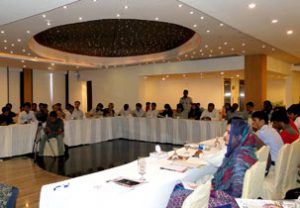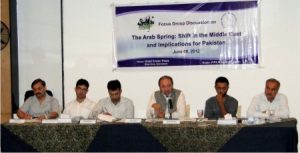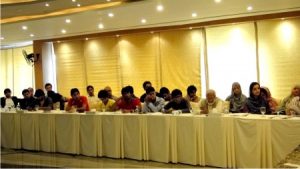The Arab Spring: Shift in the Middle East and Implications for Pakistan
There are some similarities and several differences between the situations in Pakistan in recent years and the state of affairs in those Middle Eastern and North African countries where mass uprisings were characterized as the Arab spring over the past one year or so. Distinct factors have been dictatorial regimes, corruption, and lack of basic freedoms in the Arab spring countries. Conspiracy theories abound about the western involvement in the events of the Arab spring, but these were largely a result of indigenous movements, a thirst for democracy, and an attempt to  uphold the dignity of the common people. Because of Pakistan’s traditional links with the Middle East, events taking place in that region have considerable influence on Pakistan, which has prompted some analysts to express concern about the implications of the Arab spring for Pakistan. There has not been a similar uprising in Pakistan despite the country sharing with the Arab spring countries challenges such as corruption, dictatorial regimes or nominally democratic and unresponsive governments, internal socio-political turmoil and an aggravated security situation. These observations were made by speakers at a focused group discussion titled “The Arab Spring: Shift in the Middle East and Implications for Pakistan”. The discussion was organized by Pak Institute for Peace Studies (PIPS) and Khudi Pakistan in Islamabad on June 8, 2012. Ayaz Wazir, a former Pakistani ambassador, chaired the discussion. The panelists were Ahsan Kamal, a lecturer at National Institute of Pakistan Studies, Quaid-i-Azam University, Islamabad; Dr. Khadim Hussain, director Bacha Khan Educational Foundation, Peshawar; and Air Commodore (Retd) Khalid Iqbal from Islamabad Policy Research Institute (IPRI). Civil society activists, journalists, and students from leading universities attended the discussion in large numbers.
uphold the dignity of the common people. Because of Pakistan’s traditional links with the Middle East, events taking place in that region have considerable influence on Pakistan, which has prompted some analysts to express concern about the implications of the Arab spring for Pakistan. There has not been a similar uprising in Pakistan despite the country sharing with the Arab spring countries challenges such as corruption, dictatorial regimes or nominally democratic and unresponsive governments, internal socio-political turmoil and an aggravated security situation. These observations were made by speakers at a focused group discussion titled “The Arab Spring: Shift in the Middle East and Implications for Pakistan”. The discussion was organized by Pak Institute for Peace Studies (PIPS) and Khudi Pakistan in Islamabad on June 8, 2012. Ayaz Wazir, a former Pakistani ambassador, chaired the discussion. The panelists were Ahsan Kamal, a lecturer at National Institute of Pakistan Studies, Quaid-i-Azam University, Islamabad; Dr. Khadim Hussain, director Bacha Khan Educational Foundation, Peshawar; and Air Commodore (Retd) Khalid Iqbal from Islamabad Policy Research Institute (IPRI). Civil society activists, journalists, and students from leading universities attended the discussion in large numbers.

The panelists drew important distinctions between Pakistan and the countries in the Middle East and North Africa that have experienced mass uprisings. First and foremost was the fact that Pakistan is a democracy; may be an imperfect and dysfunctional one at times but a system is there; the people have participated in the political system in the past and as far as democratic governments are concerned have had a say in who governs them. Pakistan had also witnessed movements on a large scale, such as the lawyers’ movements in addition to the near-daily strikes against electricity and gas shortages on other issues. In Pakistan the social media is active and provides an opportunity to the educated masses to raise their voice against issues of concern to them.
 After comments by the chair and the panelists, the floor opened for general discussion, in which students and civil society activists keenly participated and drew attention to various aspects of the events in the Middle East and the similarities and differences of those with the situation in Pakistan. The two key questions that many participants asked of the panelists were: Could the religious-political parties influence the uprising in the Arab countries because of their strong religious and ideological affiliations with Arab states? And why has the Pakistan government stayed quite regarding these developments and the media has not given due coverage to the Arab spring? It was noted that the uprisings in the Middle East had been truly on the basis of nationalism and religious elements were not very pronounced and that was why the religious-political parties in Pakistan had not shown much interest in the events of the Arab spring. The panelists said that it was the failing of the government and the media that they had not responded to or looked at the change in the Middle East and North Africa in the manner that they should have. The panelists noted that deep internal turmoil and a litany of problems that Pakistan faced might have kept the government focused on the domestic situation to the exclusion of events taking place in the Middle East, however, the Pakistani media had missed an opportunity to play a positive role regarding the events in the Middle East.That there has not been a broad-based or mass uprising in Pakistan despite deep resentment over the prevailing situation could be that unlike the Middle Eastern countries in question, Pakistan is divided along the lines of ethnicity, social standing and language. There is also a lack of common leadership and many political entities have their own interests that they do not appear to be willing to rise above. “To witness such a revolt in Pakistan, it is imperative that every interest group involved has an equal share,” said Dr. Khadim Hussain. Ahsan Kamal said that the youth feared that their movements could be hijacked by other elements and used for the benefit of one political group or another. Khalid Iqbal said that as had become apparent from the breakup of Yugoslavia that there are many stakeholders in one state and to incorporate them all within the state is important to sustain the state. In the Middle East, social media had played an active role in the uprisings.
After comments by the chair and the panelists, the floor opened for general discussion, in which students and civil society activists keenly participated and drew attention to various aspects of the events in the Middle East and the similarities and differences of those with the situation in Pakistan. The two key questions that many participants asked of the panelists were: Could the religious-political parties influence the uprising in the Arab countries because of their strong religious and ideological affiliations with Arab states? And why has the Pakistan government stayed quite regarding these developments and the media has not given due coverage to the Arab spring? It was noted that the uprisings in the Middle East had been truly on the basis of nationalism and religious elements were not very pronounced and that was why the religious-political parties in Pakistan had not shown much interest in the events of the Arab spring. The panelists said that it was the failing of the government and the media that they had not responded to or looked at the change in the Middle East and North Africa in the manner that they should have. The panelists noted that deep internal turmoil and a litany of problems that Pakistan faced might have kept the government focused on the domestic situation to the exclusion of events taking place in the Middle East, however, the Pakistani media had missed an opportunity to play a positive role regarding the events in the Middle East.That there has not been a broad-based or mass uprising in Pakistan despite deep resentment over the prevailing situation could be that unlike the Middle Eastern countries in question, Pakistan is divided along the lines of ethnicity, social standing and language. There is also a lack of common leadership and many political entities have their own interests that they do not appear to be willing to rise above. “To witness such a revolt in Pakistan, it is imperative that every interest group involved has an equal share,” said Dr. Khadim Hussain. Ahsan Kamal said that the youth feared that their movements could be hijacked by other elements and used for the benefit of one political group or another. Khalid Iqbal said that as had become apparent from the breakup of Yugoslavia that there are many stakeholders in one state and to incorporate them all within the state is important to sustain the state. In the Middle East, social media had played an active role in the uprisings.
Despite reasons such as these, which have been hindering a mass movement, the panelists agreed that there was no need for optimism or delusions that Pakistan was somehow immune from the kind of change sweeping the Middle East. They said that if the government failed to address the people’s basic needs and remained unable to resolve ethnic unrest in many parts of the country then the prospects of such an uprising in Pakistan in the next few years were there.


